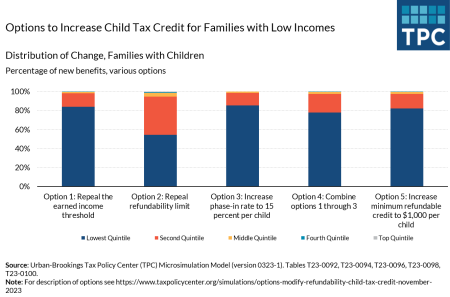The U.S. Supreme Court will soon hear oral arguments in a case that raises a question most people have likely never even considered: Can your income be taxed before you receive it? The answer is usually no, but sometimes it’s yes.
This is an important question because if Congress cannot tax income before it’s received, tax loopholes that have long been closed would be reopened. That would further tilt the tax system in the favor of the rich, potentially exacerbating the nation’s wealth divide, and costing the government hundreds of billions of dollars in lost revenue, a recent Tax Policy Center report explains.
To ordinary taxpayers, the idea of taxing unreceived income may well sound unfair and unconstitutional. Wages aren’t taxed until they’ve been received, and investment income is generally not taxed until interest or dividends are paid or the investment is sold at a profit.
However, as the Supreme Court has previously explained, delaying the taxation of income until it’s received as cash or other property is an administrative convenience, not a constitutional mandate. It is a simple way to measure income for tax purposes, and cash helps a taxpayer pay what’s due. But sometimes Congress has good reason to tax paper profits and other forms of unreceived (or, in tax parlance, unrealized) income to measure and tax that income fairly. While these exceptions are few, they are vital for the efficacy and integrity of our tax system.
In Moore v. United States, the plaintiffs are an investor couple that object to a $15,000 tax bill from their share of undistributed offshore earnings of a foreign-based company with American owners. Former President Donald Trump and a Republican Congress, as part of the 2017 restructuring of our international tax rules, imposed this one-time levy on earnings that had been stockpiled offshore by U.S. firms and investors. Without this transition tax, about $2.6 trillion of offshore earnings would have permanently escaped U.S. tax, per a 2016 letter from Congress’ Joint Committee on Taxation.
Congress modeled the 2017 transition tax on long-standing tax rules for undistributed profits of offshore corporations. Since 1937, Congress has been taxing U.S. shareholders on undistributed profits of “foreign personal holding companies.” Before then, many wealthy taxpayers had transferred their investments to “incorporated pocketbooks” in foreign countries with low or no taxes on income. Later, in 1962, Congress widened the tax rules to also include undistributed interest, dividends, royalties, and other passive income received by actual operating corporations controlled by U.S. shareholders. A ruling for the Moores would cast the viability of these long-standing anti-abuse regimes in doubt.
It also would upend other well-established taxes. Complicated forms of investment income require taxation before receipt to make sure the income is taxed fairly, or even at all. Zero-coupon bonds, contingent debt, and futures contracts are all examples of complex investment vehicles whose income is taxed before any cash is received. In today’s world of high finance, investors can see economic benefits without realization events that would normally create a tax liability.
Indeed, lawmakers may never properly tax the rich unless they expand—rather than restrict—the ability to tax unrealized gains. Under current law, inherited investment gains simply disappear for tax purposes, thanks to a loophole called “stepped-up basis.” More than 50 years ago, two leading tax experts authored a Columbia Law Review article that described the failure to tax gains in property transferred at death as “the most serious defect in our federal tax system.” A Supreme Court decision for the Moores would move us farther from closing this egregious loophole.
By invalidating existing tax rules for complex investment income, the Court would permit rich taxpayers to dodge their fair share of taxes. If less tax is collected from wealthy investors, more tax must be collected from wage-earners and consumers, which would shift burdens from the rich to the poor. With national debt and economic inequality rising and the public expecting more from their government, now is not the time for the Court to invalidate existing taxes that fall almost entirely on the wealthiest Americans.
To avoid legal and economic upheaval, Congress must maintain its broad constitutional authority to “lay and collect” taxes including, sometimes, on unrealized income. Only Congress, with its resources, expertise, and experience, can create tax rules for sophisticated international and capital markets that properly balance revenue demands, administrative convenience, and fairness.
Read the full article here









